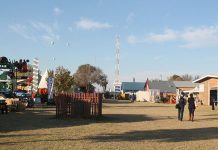That’s according to Santam Agriculture agrometeorologist Johan van den Berg. “We’re still in a La Niña phase, so sea surface temperatures are cooler than normal,” he explained. “La Niña will probably last until at least March/April 2011.”
Although there’s a probability of drier conditions in February for the eastern to north-eastern parts of the country, there should be good rain for the rest of summer for most of the summer rainfall areas. That includes the northern parts of the southern Cape, the Garden Route and the Eastern Cape. “Hopefully the drought will be broken, because it’s still relatively dry there,” said Van den Berg.
Storage dam levels in most provinces were in relatively good condition at the end of November, but 5% to 10% lower on average compared to the same time in 2009. And irrigation conditions look favourable at this stage. Fairly good conditions are expected for crop production, although there might be some drier spots during the season. Sugarcane farmers will hopefully feel some relief after an extremely dry 2010. “We don’t foresee a drought for sugarcane at this stage, although there may be a drier spell in February/March,” said Van den Berg.
Autumn and the first part of winter may be relatively dry in the Western Cape – and may pose some problems for wheat farmers in the planting and emerging phase of wheat and other crops, in April/May/June. Grainvest weather analyst Louis Botha said maize farmers in the North West, the Free State, northern KZN, Gauteng and Mpumalanga can hope for a good growing season up to the end of March/April 2011. “I expect 2011 will be a good cropping year over the whole maize growing area,” he said. “Normal to above-normal rainfall is predicted with a possibility of some good falls during the period December to February.”








